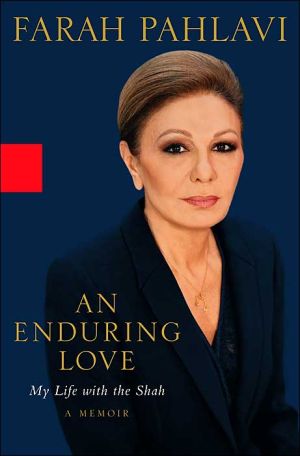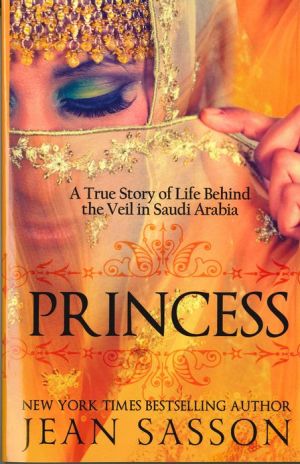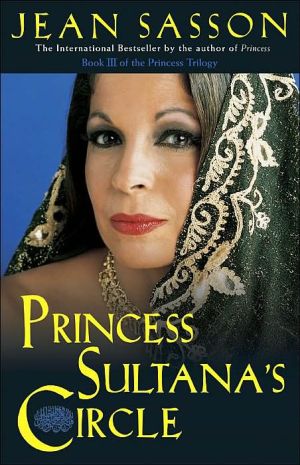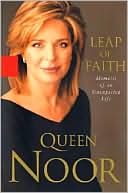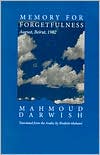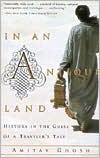An Enduring Love: My Life with the Shah
Her story began like a fairy tale. At the age of twenty-one, Farah Diba married the shah of Iran, Mohammed Reza Shah Pahlavi. In a matter of days, her quiet life was turned upside down: her coronation as the empress of Iran was covered in the world's press, and overnight she became an international celebrity. A loving marriage, the raising of four children, and a devotion to social and cultural causes marked her early years as queen, although there were already signs of grave national...
Search in google:
A moving story of the former Empress of Iran — now in paperback.At the age of twenty-one, Farah Diba married the Shah of Iran, Mohammed Reza Shah Pahlavi. A loving marriage, the raising of four children, and a devotion to social and cultural causes marked her early years as queen, although there were already signs of grave national diversions on the horizon. Twenty years later the dream had turned into a nightmare: demonstrations and riots shook the country, and Farah and the Shah decided to leave in order to avoid bloodshed. With the hardcover publication of An Enduring Love, a New York Times bestseller (extended list) in 2004, Farah Diba, wife of the last emperor of Iran, broke her silence and told the wrenching story of her love for a man and his country. Her compelling memoir offers an intimate view of a time of upheaval, but stands above all as a powerful human document from one whose life was caught up in an epic and tragic national struggle. Her Majesty Queen Farah Pahlavi divides her time between Paris, France and Washington, D.C. Publishers Weekly The memoir of Farah (Diba) Pahlavi, widow of the Shah of Iran, seems, at first glance, like a clone of Noor's bestselling Leap of Faith. Both queens were intelligent young women when they met and married their older kings; both remain discreet about their intimate lives with their husbands (who both loved piloting planes and playing with their children); both immersed themselves, as new queens, in cultural programs and social betterment work for their people; and both end their memoirs shortly after the deaths of their husbands. The parallels are almost uncanny-at least until midway through Pahlavi's story, when the real differences emerge. In 1963, the Shah began his "white revolution" to modernize Iran by instituting land reform, women's rights and workers' rights; Communists and fundamentalist clerics vehemently opposed these changes. In Pahlavi's eyes, the monarchy stood for liberalization, even if its enforcement agencies were condemned worldwide for human rights abuses. To her, criticism of the monarchy only supported Khomeini's Islamic fundamentalist opposition. As the insurgency gained strength and the royal family weighed exit strategies, Pahlavi shouldered a new, personal burden: the Shah's concealed battle with cancer. Asylum offers were few. Sadat welcomed them to Egypt, but their stays in the Bahamas, Mexico, the United States and Panama were politically difficult. The Shah's medical treatments, meanwhile, were so bungled, so shaded by political maneuvering, that Pahlavi resorts to quoting extensively from one doctor's records. She ends her account with the Shah's death in 1980, their youngest daughter's death and the Iran-Iraq War, while Pahlavi's life has continued in Paris and Washington, DC. Readers seeking a female perspective on Iran's turbulent recent history will enjoy this candid, straightforward account. (Mar.) Forecast: Ads in the New York Times and USA Today, a 20/20 appearance, and a 20-city TV satellite tour will ignite sales of Pahlavi's book. Copyright 2003 Reed Business Information.
An Enduring Love\ \ By FARAH PAHLAVI \ MIRAMAX BOOKS\ Copyright © 2004 Farah Pahlavi\ All right reserved.\ ISBN: 1-4013-5209-X \ \ \ Chapter One\ I still have my father's amazed and delighted account of my earliest days: a school exercise book he himself illustrated in which his love pours out of every line. Obviously delirious with joy, he noted down my weight, my smiles, my babbling, or what he thought I was saying. And then suddenly all this enchantment plunges into the worst nightmare. "This Friday," he writes on page five, "is one of the saddest of my life. Farah has caught a chill. The stupid nanny did not take proper care of her. I was in the center of Tehran when I heard the news and immediately hired a car to get back to Shemiran. My poor little girl was lying in bed; she looked terrible and her breathing was labored. Her mother was in tears. Dr. Towfigh arrived at last. She had acute tonsillitis! She has a high temperature. We applied compresses all through the night and didn't sleep until morning." \ There is a big question mark and below it a sketch of me in bed with a large compress across my forehead. "Will she survive?" my father seems to be saying to himself. Mother is sobbing on my left and, on my right, Father has drawn himself with his head in his hands, clearly overcome by grief.\ After a few days, however, my health improved. "Thanks be to God," my father wrote, "Farah has improved, but we were worried sick."\ That was in 1939. At that time we were living to the north of Tehran in a house with an enclosed garden built at the beginning of the century. I grew up in that house, which we shared with my mother's brother, Uncle Mohammad-Ali, and his wife, Louise. The two couples had a large bedroom each on the first floor and shared a communal family living room. It is traditional in Iran to have reception rooms and the dining room on the second floor for the exclusive use of guests and entertaining. My father, however, had his study there also.\ The Ghotbis had a son six months before I was born, so my cousin Reza was no doubt the first child whose face I ever smiled at. We took our first steps together and Reza became the brother I never had. I found out much later, when I was grown up, that my parents had wanted to have another child but that the aftermath of the Second World War in Iran had made them decide against it. Once British and Russian troops occupied the country in August 1941, the future looked bleak for almost four years.\ And so I stayed an only child, probably more precious than ever to my parents. I have been told how anxious my father was about me: he was haunted by the fear that I would suddenly catch some illness. As some inoculations were not yet available in our country, he thought it wisest to forbid people to touch me and especially to kiss me. That did not stop me from catching all the usual childhood diseases, and in any case, the older and more independent I became, the less he could prevent me from seeing people.\ The closest to us, apart from the family, were those who worked for us in the house: my nanny, Monavar, a young woman with great charm and humor whom I loved dearly; the cook; the chambermaid; and also two men who did odd jobs around the house. Reza and I were fond of all of them, especially as they loved having us around them and spoiled us dreadfully. They lived in a recently constructed building at the other end of the courtyard. As soon as our parents had gone out, we would run over to them. Some of them would take us on their knees and sometimes tell us scary stories, which gave us an inkling that the world was much more frightening and mysterious than our mothers told us. In a storeroom attached to this building, we kept food to supply us for several months: dried beans and lentils, rice, sugar, almonds, cooking oil, and so forth. I can remember my mother shrieking when she entered the room one day and found mice running about. The cook ran to her aid, and Reza and I took advantage of all the confusion to creep behind him into this storehouse full of strong scents still unfamiliar to us.\ We could hear the world of disease and danger, as my parents saw it, teeming outside the high, brick garden walls. We were, of course, forbidden to venture into the street, but as soon as my parents turned their backs, we settled ourselves on the smooth polished steps of the porch and watched people coming and going behind the iron gate. It was during the occupation and life certainly was not easy. As for the war, which was taking place far beyond the mountains in the USSR, our redoubtable neighbor to the north, we sometimes overheard the adults talking about it. And the jeeps of the British soldiers always fascinated us. There were many beggars who regularly came to us. We knew them by name, and my parents, in anticipation of their visits, never threw anything out. We gave them food, clothing, and even toys for their children. The streets were full of children when the weather was fine, and we chatted through the gate with those who were allowed to play outside. In those days people still traveled in horse-drawn cabs-very few had the means to buy a car-and I remember that one of the kids' favorite games was to grab on to the back of the carriage for a free ride. We were fascinated by that, especially as pedestrians would shout out to the coachman, "You've got someone on your back!" The coachman would then detach the young stowaway with a big circular crack of his whip. We were speechless.\ But of all the sights in the street, the one that enchanted me most came from the hawkers. They brought seasonal fruits on hand-painted donkey carts or on big trays balanced on their heads. In winter it was mandarins, oranges, oven-cooked beets. Then we waited impatiently for spring when we could taste strawberries, green plums, fresh almonds, radishes, white onions and herbs: mint, tarragon, and basil, which the merchants watered constantly. And finally, in the first days of summer-always so hot in Tehran-cherries, rose-perfumed apples, and apricots arrived. Later there were rock melons and watermelons and, of course, the ice-cream sellers. We adored them, but naturally we were forbidden to approach them. Our parents took turns explaining to us what a danger these ices were to our health, full of the worst germs imaginable. And yet I can still see us scampering out of the porch to share some of that delicious poison between two wafers. Lollipops, which we called "sugar roosters," were also forbidden, as our parents suspected that the terrible dust from the street stuck to them.\ But the real danger came from the water. It was a precious commodity in our country, and the water trade at that time was part of the rhythm of daily life. Drinking water was scarce, coming from only two springs that provided for the capital. It was delivered around the whole town by horses drawing water tanks. Like the vegetable sellers, the water bearer announced his presence with his own song. People came out with pitchers, which he filled for a few coins.\ Water for washing and household use came from the Alborz Mountains overlooking Tehran through a system of open channels running down every street. Every district had its day for receiving this muddy running water. Directed by small dams, it flowed for a few hours into a tank under the house or a reservoir usually dug in the courtyard or the garden. We had both tank and reservoir, and I remember watching with great curiosity as all the water with rubbish collected further up the channel flowed into them: watermelon peel, dead leaves, cigarette butts, bits of wood. The water settled after a day or two and could be pumped up into a tank in the attic, which supplied the kitchen and the bathrooms. In spite of the quicklime added to the water in the tank, little worms proliferated there; our parents were forever telling us never to drink water from the faucet.\ From time to time the toy seller would suddenly appear out of the fascinating swarm of people in the street, carrying his shop on his head. It was a jumbled collection of all the treasures children of the day dreamed about: wooden and terra-cotta flutes, multicolored paper windmills, balls, rackets, and castanets made of two terra-cotta disks held together with pleated paper. We were sometimes allowed a little something, but we mostly made toys ourselves or with the help of the men who worked in the household. I remember that we dragged our dolls about in shoe boxes, that the boys rolled old bicycle wheels for hoops, that our scooters were made of carefully salvaged bits and pieces. However, there are two marvelous things that I remember best: a doll that said "mama" and a real child's bicycle from the prestigious English firm BSA.\ And sometimes behind the toy seller came the magician with his traveling picture show. He pushed a small cart with shining brass and four little windows a child could pay to look into. The man would then run through a series of pictures or drawings while telling us a magic story in a voice charged with emotion and amusement. Sometimes he would also sing. We could not bear to give up this enchantment, called Shahr-e-Farang, but it too, was forbidden. Our parents feared that we would catch trachoma, a terrible, extremely contagious bacterium that attacks the eyes and at that time made many children blind.\ Reza and I luckily escaped trachoma, but I was not spared "the Oriental spot." Less serious than trachoma, this is a mosquito bite that leaves an indelible mark. Mine was on the top of my right hand. My father thought that as such things go, we had been lucky, since many are bitten on the face. He nonetheless asked the doctor to do the impossible, to limit the size of the scar. My mother told me he said, "You never know, Doctor, perhaps one day people will kiss my daughter's hand."\ In spite of the many temptations offered in the street outside, my greatest pleasure as a child was to get out of Tehran in the summer and go to Shemiran on the slopes of the Alborz Mountains. We left the furnace-like heat and the dusty torpor of Tehran for the light air of the mountains and the surprising coolness of the evenings. Today Shemiran is a wealthy, much sought-after suburb to the north of Tehran. When I was a child, it was a delightful village about a dozen kilometers from the city center, high up at an altitude of 1,800 meters. Our parents rented a villa in this rustic paradise for two months in the summer. We squashed into my father's big Ford, with the rest of the household following in carriages. It was like a caravan, a veritable exodus. I adored that road as it wound between enormous plane trees and small bushes of yellow roses, from which our mothers picked buds to make candy.\ At Shemiran we joined a whole string of little cousins and friends whose parents had properties there. I sometimes played with dolls, but never for very long. I was more of a tomboy, preferring dodge ball, hide-and-seek, donkey rides, or walking in the countryside and the mountains, anything that meant I could avoid a siesta. I loved making houses of earth with my hands in the mud or breaking fresh walnuts, which left black stains on my hands. I remember that we cleaned up by rubbing ourselves with mulberry leaves. I loved climbing trees. The trees were my friends. Pear trees, apple trees, walnuts, loquats, mulberries-I knew them individually, and once perched on a branch, I often forgot the game and had little desire to climb down again, especially when I made myself a comfortable nest with branches and a rug. I would gaze at the huge expanse of the sky and dream, sometimes until nightfall, or until the others began to worry that they would never find me.\ Evenings at Shemiran were pure enchantment. We all gathered in the town square like one big family. Little stalls offered food on skewers, barbecued corn, fresh walnuts, all kinds of cakes and confectionary, not to mention ice cream, which for once we were allowed to eat. While our parents took a stroll or sat on a café terrace, we children chased each other around the stalls, wildly excited from the effects of so much laughter and sweets. When we went home we were often allowed to sleep all together in a large living room. Mattresses were put on the floor, and for Reza and me, who slept like good little children in our parents' rooms all winter, it was like another world, a wonderful party.\ We were still at war when I first went to the Italian School in Tehran. My parents had chosen it because French was taught there. My father, Sohrab Diba, was a French speaker, very attached to France. He was from a prominent family in Azarbaijan that had served at court under the Qajars, then under Reza Shah. Son of a diplomat who spoke fluent French and Russian, Father was sent, with his young brother Bahram, to the St. Petersburg Cadet School at the age of twelve. They were caught by surprise by the Bolshevik Revolution of 1917-my father was sixteen at the time-but managed to get out with the aid of our ambassador. He then went to France, where he finished secondary school, studied law, and was accepted into the Military Academy of Saint-Cyr. After graduation he came back to Iran and soon began his service with the young army that Reza Shah, my future husband's father, was rallying to the flag. My mother Farideh, for her part, came from Gilan on the Caspian Sea and is a descendant of Ghotbeddin Mohammad Gilani, a revered Sufi. She went to school in Tehran at the École Jeanne d'Arc, run by French nuns, which I would also attend some years later.\ I was six when I began at the Italian School. I remember that Mother had dressed me in a tartan skirt and white blouse. I was nervous. It had been explained to me that I should mix with the other children, but I stayed in my corner hugging my little schoolbag, in which my mother had put an exercise book, a pencil, and an apple for recess.\ However, I took to school very quickly and to the freedom and access to the wider world that my new life brought with it. My father sometimes drove me in his old Ford, but he usually had a servant chaperone me both ways, giving her money for the cab fare. The young woman must have kept the money for herself, because I can remember walking long distances down the locust tree avenues of Tehran. I loved the acacias in bloom and, even today, their perfume pervades my yearning for Tehran.\ At school one of the subjects we studied was the Koran. To be precise, we learned to read the sacred book without any explanation of what it meant. What surprised me most was not being able to follow the lines with my fingers: we were not allowed to touch the Koran and so we had to make a little pointer out of paper. Like most Iranians, my parents were Shiite Muslims, but my mother was more religious than my father. She took part in rituals in which religious men came and recounted the lives of the martyrs with great feeling. My mother and all the women present would weep copiously, sometimes in the presence of professional mourners.\ \ (Continues...)\ \ \ \ Excerpted from An Enduring Love by FARAH PAHLAVI Copyright © 2004 by Farah Pahlavi. Excerpted by permission.\ All rights reserved. No part of this excerpt may be reproduced or reprinted without permission in writing from the publisher.\ Excerpts are provided by Dial-A-Book Inc. solely for the personal use of visitors to this web site. \ \
\ Publishers WeeklyThe memoir of Farah (Diba) Pahlavi, widow of the Shah of Iran, seems, at first glance, like a clone of Noor's bestselling Leap of Faith. Both queens were intelligent young women when they met and married their older kings; both remain discreet about their intimate lives with their husbands (who both loved piloting planes and playing with their children); both immersed themselves, as new queens, in cultural programs and social betterment work for their people; and both end their memoirs shortly after the deaths of their husbands. The parallels are almost uncanny-at least until midway through Pahlavi's story, when the real differences emerge. In 1963, the Shah began his "white revolution" to modernize Iran by instituting land reform, women's rights and workers' rights; Communists and fundamentalist clerics vehemently opposed these changes. In Pahlavi's eyes, the monarchy stood for liberalization, even if its enforcement agencies were condemned worldwide for human rights abuses. To her, criticism of the monarchy only supported Khomeini's Islamic fundamentalist opposition. As the insurgency gained strength and the royal family weighed exit strategies, Pahlavi shouldered a new, personal burden: the Shah's concealed battle with cancer. Asylum offers were few. Sadat welcomed them to Egypt, but their stays in the Bahamas, Mexico, the United States and Panama were politically difficult. The Shah's medical treatments, meanwhile, were so bungled, so shaded by political maneuvering, that Pahlavi resorts to quoting extensively from one doctor's records. She ends her account with the Shah's death in 1980, their youngest daughter's death and the Iran-Iraq War, while Pahlavi's life has continued in Paris and Washington, DC. Readers seeking a female perspective on Iran's turbulent recent history will enjoy this candid, straightforward account. (Mar.) Forecast: Ads in the New York Times and USA Today, a 20/20 appearance, and a 20-city TV satellite tour will ignite sales of Pahlavi's book. Copyright 2003 Reed Business Information.\ \ \ \ \ Kirkus ReviewsFlat, unconvincing apologia-cum-memoir of the Shah's years as ruler of Iran, from the ex-Shabanou. Pahlavi is on stable ground at first, describing her life as a young girl in a household of middle-class royalists, the social rhythms of her life in Tehran during the 1940s and '50s, her love of the poets Ferdowsi and Hafez, the education her family sought for her, and her early exposure to religious intolerance-a foretaste of things to come. But when she marries the Shah, her prose takes on a defensive tone that makes her claims for his progressiveness deeply suspect. Pahlavi trumpets the merits of the White Revolution, with its gestures at land reform and its undoubted achievements in literacy and extending the vote to women, but is hesitant to give full voice to the shortcomings of land distribution, to the extent of cronyism and economic corruption, and to the circumscription of political participation. She conveniently forgets to mention the CIA's involvement in the return of the Shah to power after the period of the National Front, nor does she acknowledge the sway the US had over Iranian relations in the region. She dismisses the horrendous behavior of the secret police ("quite often heavy-handed, as happens in most developing countries") and fails to accept that by denying open political expression, leaving fundamentalist religious organizations as the only large-scale, organized channels of resistance, the Shah paved the way for fanaticism to have its way in the revolution of 1979. Many readers will also be put off by the author's slavish devotion to the Shah and his infallibility; she is incredulous and adoring when she notes that her husband, his days numbered, actually made aspeech "going so far as to admit that he had made mistakes." Honest in its queen's-eye sentiments, but so selective in its memories and filled with glaring omissions that it fails miserably to inspire any faith in the author's perspective. Agent: Anna Jarota-Chodakowska/XO Editions, Paris\ \
